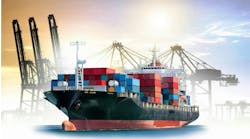Although supply chain logistics are always evolving, 2020 was a year which caused more disruption than most and organizations have been left scrambling to pick up the pieces. 2021 will see more supply chain challenges to be met, yet it will also create opportunities for organizations to leverage this disruption. Here are the biggest supply chain challenges for the coming year—and the ways you can meet them head-on.
1) Superficial Supply Chain Understanding
2020 has been a revealing year for supply chain challenges as global shutdowns have resulted in far-reaching impact. For many, the shockwaves of pandemic restrictions hit their supply chains in surprising ways, revealing that many organizations had only a superficial understanding of their supply chain complexity.
“In 2021, organizations will face a challenge unravelling this complexity,” says Michael Ward, a web developer at 1Day2Write and Writemyx. “Sophisticated supply chain understanding is essential if organizations are to be resilient in the face of global upheaval —extending from a tier-one model of supply will be the first step to weathering coming storms.”
2) Expanding Supply Chain Sources
Economizing on supply chain sources has led to many organizations working with single sources for materials. Whilst this is an efficient and low-cost mechanism for supply, it’s fast growing outdated. Organizations looking for greater resilience and security of supply in 2020 will need to invest in the expansion of their supply chains.
As developing a strategy for mitigating the risk of supply chain interruptions overtakes economizing, organizations will increasingly need to balance these delicate variables, putting strong supply chains in place whilst looking at the bottom line.
3) Adopting AI and Leveraging Data
Rapid advancements in the digital and technological world create a growing supply chain challenge for organizations. These key technologies already have a profound impact on supply chain strategy and, as AI is forecasted to contribute more than $15 trillion to the global economy in the next decade, businesses cannot afford to stand still in the face of evolving tech.
Adapting to industry-specific technological advancements must be at the forefront of supply chain strategists’ minds and, as the Internet of Things (IoT) generates enormous amounts of data, organizations must have specific processes for utilizing and responding to this data if they don’t want to be left behind.
4) Keeping Up with Customer Expectations
As the world grows ever more connected, customer-facing businesses are going to be challenged with keeping up with expanding customer expectations. Amazon has been on the cutting edge of supply chain innovation for a number of years and is influencing consumers to have higher expectations of logistical movement than ever before.
“As paying for shipping becomes a thing of the past and next-day or even same-day supply becomes the rule, organizations will need all hands on deck to keep pace with expanding customer expectations,” says Gina Motta, a tech writer at Britstudent and Phdkingdom. “Focusing on customer experience will provide businesses with a strong footing in the marketplace but gaining this edge might involve reimagining your supply chain.”
5) Radically Decentralized Motor Carriers
Trucking remains the central domestic model for transportation, with almost three quarters of domestic freight being moved by truck. Remarkably, this industry has been exceptionally resistant to centralization and there remains a vast number of independent hauling companies running small numbers of trucks. This dispersal of this supply chain network presents a big challenge in the future, as increased access to data requires a centralized hub for optimized logistical strategy.
Organizations will need to work closely with independent trucking firms, finding channels for data to flow back and forth and be used in an efficient way. Aligning decentralized haulage with optimized strategy is a growing challenge in supply chains.
Signed, Sealed and Delivered
2020 has been a challenging year for supply chain disruption, but it has also presented opportunities for change in organizations’ approach to supply chains that will pay dividends. Businesses that are ready and willing to adapt to the new supply chain ecosystem, diversifying their operations and leveraging data, can continue to capitalize on this in 2021. Face up to supply chain challenges and you could see your business grow more than ever in the coming year.









